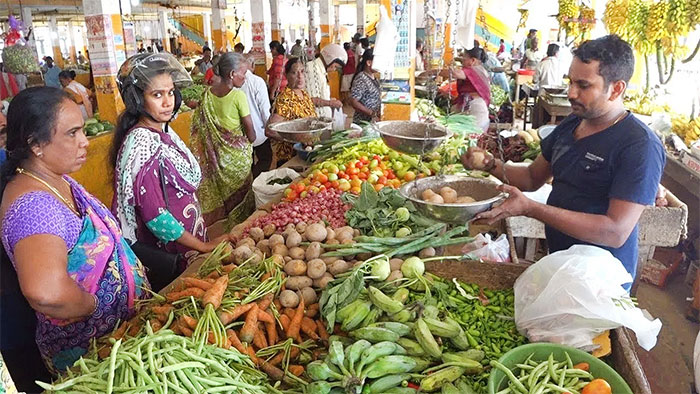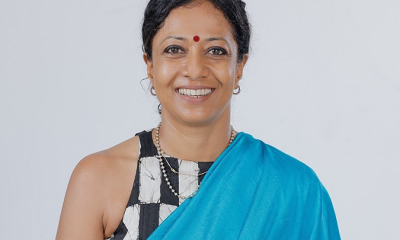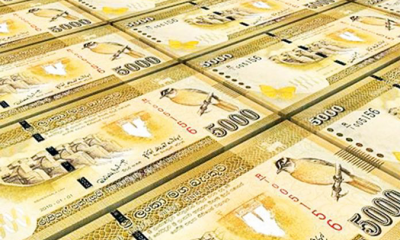Business
Is Sri Lanka heading for authoritarian statism?

by Seneka Abeyratne
The immediate future of Sri Lanka is extremely bleak as the economic and political crises are continuing to reinforce each other in a synergistic manner. Because the government is totally bankrupt and unable to meet its external debt-service obligations, it is having difficulty securing bridging loans to finance imports of essential goods. Hence, a viable alternative to bridging finance should be found as soon as possible.
Since foreign currency reserves are negligible, government should seriously consider debt to equity swaps with bilateral donors (such as China, India and Japan) as well as bona fide private creditors to boost external reserves and enable the private sector to restore the supply-chain for essential goods and services. Desperate times call for desperate solutions. Government should seek to obtain a minimum of $ 25 billion through quick debt to equity swaps. Top contenders in this regard are ports, airports, Sri Lankan Airlines, large state-owned plantations, and other state-owned facilities or lands which could be utilized by foreign investors for a variety of productive economic activities. As the old saying goes, “We can’t have our cake and eat it.”
Large fiscal deficits create
macroeconomic instability
The fiscal deficit in Sri Lanka increased from 11.1% in 2020 to 12.2% in 2021, largely due to a decrease in the revenue + grants to GDP ratio from 9.1% to 8.7% and an increase in the expenditure to GDP ratio from 20.2% to 20.1% over the same period. This is not a sustainable fiscal path, which is why government is resorting to excessive money printing, thereby adding fuel to the fire of galloping inflation. The last time Sri Lanka registered a fiscal deficit of under 5% was in 1977. Large fiscal deficits create macroeconomic instability and discourage foreign direct investment (FDI). No country in Asia has prospered without a stable macroeconomic climate and substantial FDI inflows on a sustained basis.
Key elements of a macroeconomic
stabilization program
Both a stable and consistent macroeconomic policy framework and a robust business climate are necessary for attracting significant inflows of export-oriented FDI on a sustained basis. In this regard, transaction costs should be eliminated wherever possible. A macroeconomic stabilization program should focus on fiscal consolidation in the medium term. This will include (a) a substantial increase in direct and indirect tax revenue; (b) rationalization of recurrent and capital expenditures; and (c) the exercise of fiscal discipline in all public institutions. The program should be accompanied by a comprehensive external debt-restructuring exercise with a view towards attaining debt sustainability in the medium term. The relevance of debt to equity swaps should be critically assessed in this context.
On the revenue side, key policy reforms would include restoration of VAT and income tax to their pre-2019 levels and measures for achieving a substantial increase in the income tax to GDP ratio, which was only 1.8% in 2021. On the recurrent expenditure side, downsizing of the public service (including the military), restructuring/privatization of loss-making state-owned business enterprises (in all sectors of the economy), and a significant reduction of government subsidies could be viewed as three critical policy reforms. In respect of capital expenditure, the need for focusing future expenditures on infrastructure for supporting significant improvements in education, health, and export performance is critical.
On the monetary side, maintaining a flexible, market-float policy for the exchange rate is vital for stimulating exports, enhancing FDI inflows and foreign remittances, and promoting tourism. These are the main avenues for boosting foreign currency reserves in the medium to long term. Maintaining a tight monetary policy vis-à-vis high interest rates is also vital for reducing inflation and enhancing foreign capital inflows.
Market distortions retard
economic growth
Removal of market distortions is critical for stimulating increased private-sector development and for achieving a rapid and sustainable economic recovery. At present, imports are heavily controlled and regulated by the state due to the severe dollar crisis. However, without a liberal trade and investment policy, the economy is likely to remain stagnant as a wide range of imported intermediate goods are required by entrepreneurs in the manufacturing, processing and service sectors. Imports of intermediate goods (including fuel, fertilizer and agrochemicals) as well as consumer goods linked to tourism should hence be liberalized.
Import bans are tantamount to protectionism, which tends to drastically inhibit GDP growth. Protectionism discourages FDI inflows as well as foreign remittances through the banking system. Protectionism does not stimulate economic growth. On the contrary, it creates economic stagnation and widespread poverty and underemployment.
The Daily Mirror of July 26th reported that government may restrict fuel imports for the next 12 months due to the foreign exchange crisis. This will do more harm than good as it will worsen macroeconomic imbalances. A far better option is to liberalize fuel imports so as to create space for the private sector to supply the markets.
Generally speaking, with a few exceptions, the market, not the state, should determine the prices of goods and services available to consumers. A significant number of public enterprises and services would become profitable if they were exempted from price controls and permitted to adopt a cost-reflective pricing mechanism.
Authoritarian statism
What we are currently witnessing in Sri Lanka is the rise of authoritarian statism – a protectionist, state-dominated economic growth model similar to the one introduced by the Sirimavo Bandaranaike regime of the 1970s. The experiment proved to be a colossal failure, which is why this inward-looking, statist regime got booted out of power in 1977.
The private sector is the engine of growth, not the state. The shackling of the private sector is not the solution to the current economic crisis. What is needed at this time are deep structural and market reforms aimed at promoting private sector development as well as improved productivity across all spheres of economic activity so that Sri Lanka could become globally competitive in a wide range of exports.
The author is a retired economist/international consultant to ADB MANILA. He can be contacted at snabeyratne@gmail.com
Business
AHK Sri Lanka champions first-ever Sri Lankan delegation at Drupa 2024

The Delegation of German Industry and Commerce in Sri Lanka (AHK Sri Lanka) proudly facilitated the first-ever Sri Lankan delegation’s participation at Drupa 2024, the world’s largest trade fair for the printing industry and technology. Held after an eight-year hiatus, Drupa 2024 was a landmark event, marking significant advancements and opportunities in the global printing industry.
AHK Sri Lanka played a pivotal role in organising and supporting the delegation, which comprised 17 members from the Sri Lanka Association for Printers (SLAP), representing eight companies from the commercial, newspaper, stationery printing, and packaging industries. This pioneering effort by AHK Sri Lanka not only showcased the diverse capabilities of Sri Lanka’s printing sector but also facilitated vital bilateral discussions with key stakeholders from the German printing industry.
Business
Unveiling Ayugiri: Browns Hotels & Resorts sets the stage for a new era in luxury Ayurveda Wellness

In a captivating reimagining of luxury wellness tourism, Browns Hotels & Resorts proudly unveiled the exquisite Ayugiri Ayurveda Wellness Resort Sigiriya. This momentous occasion, celebrated amidst a vibrant and serene grand opening on the 6th of June, heralds a new chapter in the Ayurveda wellness tourism landscape in Sri Lanka. Nestled amidst 54 acres of unspoiled natural splendour, Ayugiri features 22 exclusive suites and stands out as the only luxury Ayurveda wellness resort in the country offering plunge pools in every room, rendering it truly one-of-a-kind.
The grand opening of Ayugiri Ayurveda Wellness Resort was an enchanting event, where guests were captivated by the melodies of flutists and violinists resonating through Sigiriya’s lush landscapes. As traditional drummers and dancers infused the air with vibrant energy, Browns Hotels & Resorts’ CEO, Eksath Wijeratne, Kotaro Katsuki, Acting Ambassador for the Embassy of Japan and General Manager, Buwaneka Bandara, unveiled the resort’s new logo, marking a significant moment witnessed by distinguished guests from the French Embassy, Ayurveda and wellness enthusiasts along with officials from the Sigiriya area, LOLC Holdings and Browns Group.
“Our strategic expansion into wellness tourism with Ayugiri Ayurveda Wellness Resort Sigiriya symbolises a significant milestone for Browns Hotels & Resorts. Wellness tourism has consistently outperformed the overall tourism industry for over a decade, reflecting a growing global interest in travel that goes beyond leisure to offer rejuvenation and holistic well-being. By integrating the timeless wisdom of Ayurveda with modern luxury, we aim to set a new standard in luxury wellness tourism in Sri Lanka. Whether your goal is prevention, healing, or a deeper connection to inner harmony, Ayugiri offers a sanctuary for holistic well-being” stated Eksath Wijeratne.
Ayugiri encapsulates the essence of life, inspired by the lotus flower held by the graceful queens of the infamous Sigiriya frescoes. Just as the lotus emerges from the murky depths, untainted and serene,
Ayugiri invites guests on a journey of purity and rejuvenation, harmonised with a balance of mind, body and spirit, the essence of nature, echoes of culture and the wisdom of ancient Ayurvedic healing.
Business
HNB General Insurance recognized as Best General Bancassurance Provider in Sri Lanka 2024

HNB General Insurance, one of Sri Lanka’s leading general insurance providers, has been honored as the Best General Bancassurance Provider in Sri Lanka 2024 by the prestigious Global Banking and Finance Review – UK.
The esteemed accolade underscores HNB General Insurance’s unwavering commitment to excellence and its outstanding performance in the field of bancassurance. Through dedication and hard work, the HNB General Insurance team has continuously endeavored to deliver innovative insurance solutions, cultivate strong relationships with banking partners, and provide unparalleled service to customers nationwide. This recognition is a testament to the team’s dedication and relentless pursuit of excellence in the bancassurance business.
“We are honored to receive this prestigious award, which reflects our team’s tireless efforts and dedication to delivering value-added insurance solutions and exceptional service through our bancassurance partnerships,” said Sithumina Jayasundara, CEO of HNB General Insurance. “This recognition reaffirms our position as a trusted insurance provider in Sri Lanka and motivates us to continue striving for excellence in serving our customers and communities.”
























